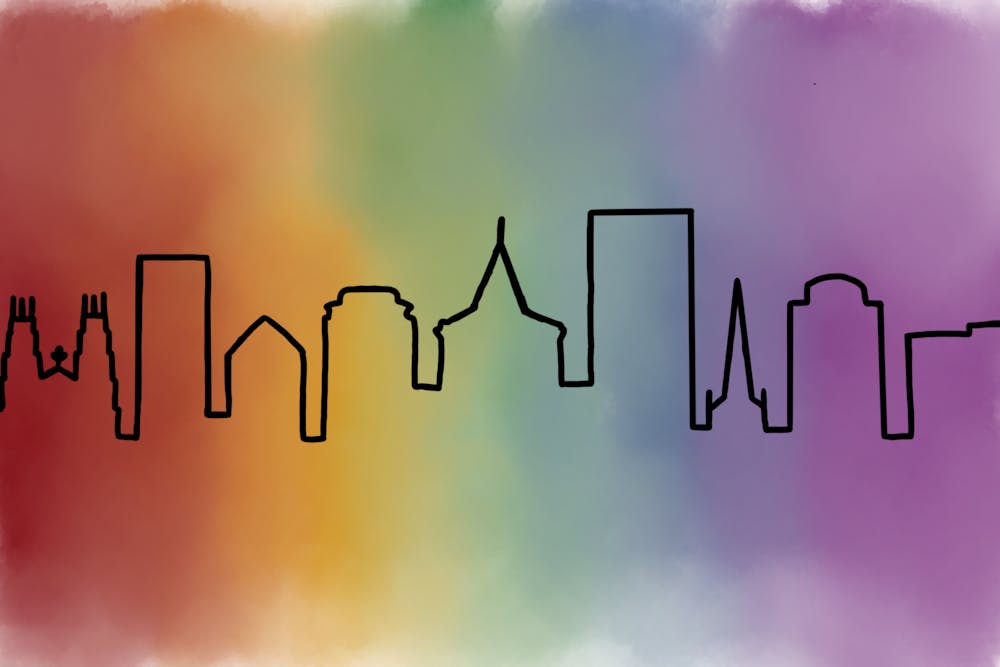When We're Here! steering committee member Ed Madden started at USC in 1994, only a single folder was dedicated to LGBTQIA+ history in the University Libraries.
"It was newspaper clippings, mostly of controversial things that have happened or, you know, people being prosecuted or scandals," Madden, a professor in USC's Department of English Language and Literature and the interim director of the Women's and Gender Studies program at USC, said.
The We're Here! project's goal is to tell the untold stories of the LGBTQIA+ community in Columbia by compiling historical archives and oral histories. The project is just one component of the overarching umbrella project – the LGBTQ Columbia History Initiative.
"We were interested in identifying gaps in LGBTQ history in the state of South Carolina," Travis Wagner, one of the co-founders of the Queer Cola Oral History and Digital Archive Project, said. "There's tons of recordings and history of this, but it tended to primarily focus on older gay white men and the HIV/AIDS movement. Not that those things aren't important, but it's by no means an exhaustive history of LGBTQ history in the state of South Carolina."
The We're Here! project is a collaboration of Historic Columbia, South Caroliniana Library, the Department of Oral History and more.
"It's all sort of focused on representing and building Columbia, South Carolina, and perhaps more broadly, South Carolina's LGBQIA+ history, that includes both oral histories and digital representations," Wagner said.
The We're Here! project has launched a story map website showing all the places in Columbia with significant LGBTQIA+ history. The map includes more than 250 events, organizations and businesses in more than 100 different locations.
Wagner said there are many overlooked LGBTQIA+ histories in places other than big cities, such as New York and San Francisco.
"There are tons of folks who lived in the American South who expressly identified this way and navigated what it meant to do that," Wagner said. "As early as the late 80s, there were visible attempts by folks to make themselves out in public, which contradicts again that notion that this didn't happen in the South, but also challenged my own history."
Director of Research at Historic Columbia Kat Allen said the organization partnered with the Department of Oral History to process interviews with LGBTQIA+ individuals in Columbia.
Allen said the group tries to capture the voices of individuals who won't be around much longer. A handful of interviews are done already, and it hopes to continue to conduct more.
"Attitudes have changed a lot in 15 years," Allen said. "There are a lot of people that would not have been interviewed at all 15 years ago by anyone that are now fine being interviewed and having their words quoted online."
Allen said she would like to see USC become a more significant player for LGBTQIA+ history. A few spots are coming up on critical historical milestones, such as the 50th anniversary of the attempted charter for the Gay Liberation Front that happened in 2022, according to Allen.
"So I'd love to see some more recognition for that on USC's campus and again, because attitudes have changed just dramatically, and it took a handful of really brave individuals to do that," Allen said.
The Gay Liberation Front, a supportive community for gays and lesbians, was partially organized by Micheal Grant in 1972. Grant is one of the individuals whose story the We're Here! project shares, as told by Grant himself.
Allen said she hopes USC students can use the resources put out by the We're Here! project for further research.
"What I hope is that students at USC and classes can use that as a resource and as a starting point to write honors thesis about it or graduate thesis or write a paper about it," Allen said. "But just knowing that they have a starting point for all this information so that it doesn't just live in my head or it's not just Historic Columbia's responsibility to interpret it, I think is going to be really key."

